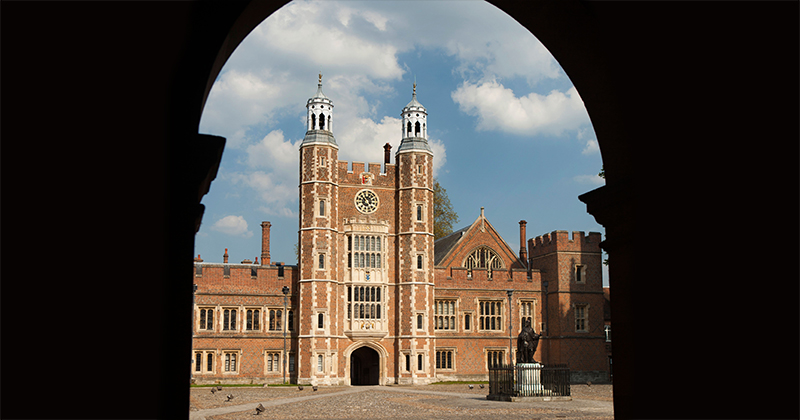Eton College will pump £1 million per year into each of its three proposed elite sixth forms in the north and midlands, declaring current funding levels are inadequate for its lofty ambitions.
The prestigious private school has partnered with the Star Academies trust to open the new sixth form colleges in areas identified for levelling up support by government.
However, FE Week can reveal Eton is stumping up an “in perpetuity” financial top-up that works out at around £2,000 extra per student, if each college meets its 480-student quota over two year groups. That’s effectively a 50 per cent uplift on top of what students in other post-16 institutions get.
Eton said the extra cash is needed to offer the educational and co-curricular opportunities available at the all-boys school, which charges nearly £50,000-a-year, as government funding rates are too low.
“The kind of provision we envisage is simply not possible under the current per student funding provided by the government for 16 to 19 settings,” an Eton spokesperson said.
The government has pinned its “levelling up” promises on delivering “elite” sixth forms to get pupils in deprived areas into the top universities.
But Lee Elliot Major, a professor of social mobility at the University of Exeter, said: “If that is what it takes, to provide an education that everyone should receive, then for me it begs the question, why aren’t all pupils funded at that level?”
Tom Richmond, a former adviser to two skills ministers and now director of think tank EDSK, added the investment was a “curious interpretation of ‘levelling up’, particularly when the government has yet to address the miserly funding settlement for 16 to 19 education in recent years”.
Eton and Star intend to bid in the next wave of free schools, with a view to opening the sixth forms in Dudley, Middlesbrough and Oldham in 2025.
They will provide “knowledge-rich teaching from subject-specialists; access to talks, academic essay prizes and debate clubs; Oxbridge-style tutorial sessions and the chance to learn Latin”.
Eton told FE Week it is drawing up an admissions policy to prioritise pupil premium students, looked after children, those would be the first in their family to attend university and also youngsters from particular postcodes.
Eton has repeatedly said the proposed colleges would not pose a problem for other post-16 providers in Dudley, Middlesbrough and Oldham.
But experts have questioned whether the extra cash will create an unequal playing field for student recruitment.
Richmond said the “question is how many potential winners and losers their philanthropy will create. The early signs are not encouraging”.
He said “far from expanding opportunities, they are seeking to limit the beneficiaries of their plans to the tiny number of students ‘lucky’ enough to attend these new institutions”.
Best way to ‘level up’?
Bill Watkin, chief executive of the Sixth Form Colleges Association, said private institutions like Eton are free to target resources at a tiny number of high performing students, but this is “unlikely to make a significant contribution to the governments levelling up agenda”.
“If Eton really wants to make an impact, it should invest in, and work in partnership with, existing sixth form providers that are busy transforming the lives of students of all abilities and doing so with a much lower unit of resource,” he added.
These sentiments were echoed by Jayne Clarke, executive principal of Oldham Sixth Form College, who said it is well understood that funding for sixth-form education should be increased.
And Association of Colleges deputy chief executive Julian Gravatt said the investment “is an argument in favour of wider investment in post-16 education and not just for those on track to selective universities”.
Eton told FE Week that it intends to increase opportunities for young people over and above those who might attend the new sixth forms.
“For example, EtonX future skills courses will be offered for free to all 11 to 16 partner schools in these towns, as will other digital content via our Eton Virtual platform,” a spokesperson said.
The institution will offer opportunities for those in partner schools to access career education, society speaker and academic enrichment programmes run by Eton and Star. Eton will also host a free residential Eton Connect summer school for year 10 students from these areas.
Some multi-academy trusts have benefited from philanthropist investments in the past.
But Sam Freedman, an ex-government adviser now at Ark Schools, said Eton’s proposed level of investment is “quite unusual” particularly in the post-16 space.
He added that he has no problem with Eton taking money from rich parents and giving it to kids who need more help, but added: “I just wish they were offering these schools to a wider range of students, rather than just those at the top.”
A DfE spokesperson said the department welcomes proposals for new sixth forms “where they are most needed to ensure that talented children from disadvantaged backgrounds have the opportunity to progress to leading universities” as part of its levelling up agenda.
CORRECTION: The original version of this article said students at Eton’s sixth forms would receive around £4,000 extra per student. This was based on Eton sharing the £1 million perpetuity between each year group of 240 students. Eton has now clarified it will be £1 million between two-year groups totalling around an extra £2,000 per student per year.







A big thank you to Eton for highlighting so clearly the shocking fact that state funded sixth form provision is so underfunded. If Eton can only deliver high quality education with an extra £2000 per student tells us two things. One: the fact that so many state funded colleges deliver such excellent results year after year on such poor funding is truly remarkable and heroic . Two: this policy will further entrench inequality rather than levelling anything up.
Thus proving that the issue is not that the state sector is in need of some mysterious expertise supposedly possessed by educators of the privileged, but rather one of chronic underfunding. So how about ending ridiculous gimmicks like this, removing private schools’ charitable status, and using the tax income to help fund state education properly?